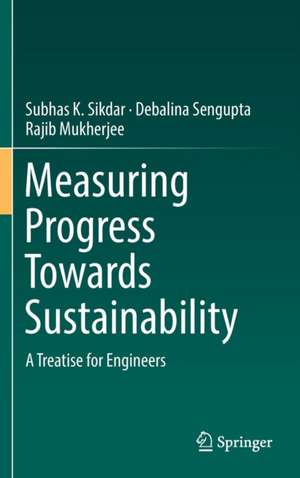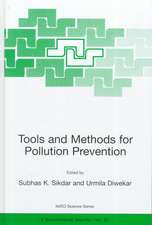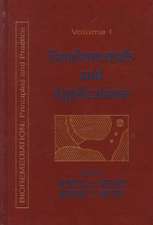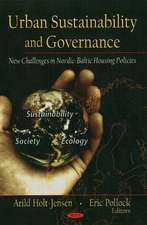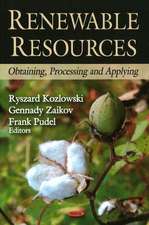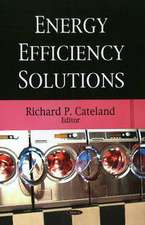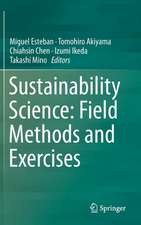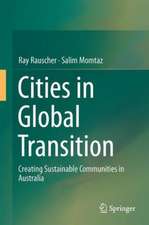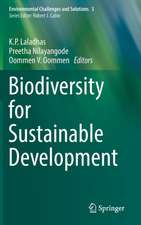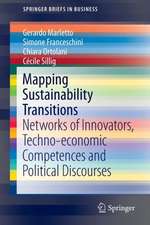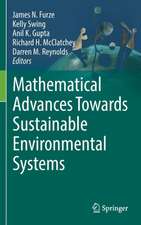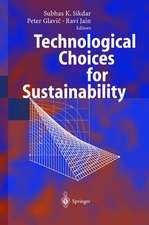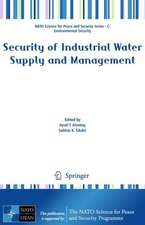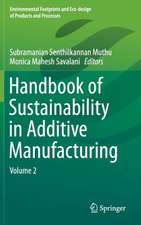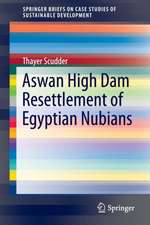Measuring Progress Towards Sustainability: A Treatise for Engineers
Autor Subhas K. Sikdar, Debalina Sengupta, Rajib Mukherjeeen Limba Engleză Hardback – dec 2016
This book is a state of the art treatise on what has been done so far on measuring sustainability for decision making. Contributions will appeal to engineers and scientists engaged in technology development, assessment, and verification. Researchers working on engineering sustainability are likely to get ideas for further research in quantifying sustainability for industrial systems. Concepts described can be applied across all scales, from process technology to global sustainability; and challenges and limitations are also addressed.
| Toate formatele și edițiile | Preț | Express |
|---|---|---|
| Paperback (1) | 640.55 lei 6-8 săpt. | |
| Springer International Publishing – 28 iun 2018 | 640.55 lei 6-8 săpt. | |
| Hardback (1) | 646.75 lei 6-8 săpt. | |
| Springer International Publishing – dec 2016 | 646.75 lei 6-8 săpt. |
Preț: 646.75 lei
Preț vechi: 760.88 lei
-15% Nou
Puncte Express: 970
Preț estimativ în valută:
123.77€ • 134.40$ • 103.97£
123.77€ • 134.40$ • 103.97£
Carte tipărită la comandă
Livrare economică 23 aprilie-07 mai
Preluare comenzi: 021 569.72.76
Specificații
ISBN-13: 9783319427171
ISBN-10: 3319427172
Pagini: 320
Ilustrații: XV, 280 p. 78 illus., 60 illus. in color.
Dimensiuni: 155 x 235 x 18 mm
Greutate: 0.59 kg
Ediția:1st ed. 2017
Editura: Springer International Publishing
Colecția Springer
Locul publicării:Cham, Switzerland
ISBN-10: 3319427172
Pagini: 320
Ilustrații: XV, 280 p. 78 illus., 60 illus. in color.
Dimensiuni: 155 x 235 x 18 mm
Greutate: 0.59 kg
Ediția:1st ed. 2017
Editura: Springer International Publishing
Colecția Springer
Locul publicării:Cham, Switzerland
Cuprins
Chapter 1. Introduction to Scientific Sustainability.- Chapter 2. Sustainability and Innovation.- Chapter 3. Engineering Sustainability, Needs for Metrology and Standards.- Chapter 4. Systems, Indicators and Sustainability Assessment.- Chapter 5. Sustainability Measurement For Technology and Business Systems: Use of Currently Available for Quantification.- Chapter 6. Data-based Statistical Algorithm for Sustainability Measurement and Decision Making.- Chapter 7. Statistical Algorithms for Sustainability Measurement and Decision Making.- Chapter 8. Case Studies in Sustainability Decision Making.- Chapter 9. Energy Sustainability, Water Sustainability.
Notă biografică
Subhas Sikdar (retired) was the Associate Director for Science at EPA’s National Risk Management Research Laboratory. He received his PhD in chemical engineering from the Univ. of Arizona (1975) and has worked for Occidental Petroleum, General Electric, NIST, and EPA, mostly in R&D management. During his technical career he has authored or coauthored more than 80 journal papers, edited 13 books, and has been awarded 26 U.S. patents. He is a Fellow of AIChE, the American Association for the Advancement of Science, and the Indian Institute of Chemical Engineers, and has received AIChE’s Research Excellence in Sustainability Award and the Lawrence K. Cecil Award in Environmental Chemical Engineering. He is the founder/editor of Clean Technologies and Environmental Policy and a section editor of Current Opinions in Chemical Engineering.
Dr. Debalina Sengupta (Associate Director, Gas and Fuels Research Center, Texas A&M Engineering Experiment Station, College Station, TX)
Debalina Sengupta obtained a Bachelor of Engineering degree in Chemical Engineering from Jadavpur University, Calcutta, India, in 2003. In 2010, she earned the Doctor of Philosophy degree in chemical engineering from the Department of Chemical Engineering at Louisiana State University, Baton Rouge, Louisiana. Her research was on the optimization of industrial complexes and sustainability analysis using Total Cost Assessment Methodology. Following this, her first book titled “Chemicals from biomass: integrating bioprocesses into chemical production complexes for sustainable development” was published by CRC Press in the Green Chemistry and Chemical Engineering Series in 2012. After her PhD, she worked at the National Risk Management Research Laboratory of the United States Environmental Protection Agency, Cincinnati, OH as an ORISE Post Doctoral Fellow in the Sustainable Technology Division. Her research at the EPA was focused on Sustainable Supply Chain Design of Biofuels and Consumer Products, and decision-making in Sustainability using metrics and indicators. She has worked at Artie McFerrin Department of Chemical Engineering at Texas A&M University as a postdoctoral research associate where she developed educational modules for sustainable manufacturing. Dr. Sengupta is currently appointed as the Associate Director of the TEES Gas and Fuels Research Center.
Dr. Rajib Mukherjee (Visiting Assistant Professor, Department of Mechanical Engineering, Texas A&M University, College Station, TX)
Rajib Mukherjee hold a Ph.D. in Chemical Engineering from Louisiana State University (2010). He conducted postdoctoral research at Tulane University, Center for Computational Science and United States Environmental Protection Agency (US EPA) as an ORISE postdoctoral fellow. At EPA he conductedresearch on sustainability assessment of chemical process. He has developed algorithm using multivariate statistical method to identify essential indicators that are necessary and sufficient for sustainability analysis. He also worked at University of Illinois Chicago/Vishwamitra Research Institute as a research engineer, developing algorithm for stochastic optimization under uncertainty. At present he is working at Texas A&M University as visiting assistant professor in the department of Mechanical Engineering. Rajib’s interest includes multi-resolution and multivariate statistical analysis, optimization under uncertainty, multi-scale modeling, sensitivity analysis and sustainability evaluation of process systems.
Textul de pe ultima copertă
This book is a state of the art treatise on what has been done so far on measuring sustainability for decision making. Contributions will appeal to engineers and scientists engaged in technology development, assessment, and verification. Researchers working on engineering sustainability are likely to get ideas for further research in quantifying sustainability for industrial systems. Concepts described can be applied across all scales, from process technology to global sustainability; and challenges and limitations are also addressed.
Readers will discover important insights about simulation-based approaches to process design and quantitative measurement techniques of sustainability for business and technology systems. Most of the examples and case studies are from chemical enterprises but the methodologies presented could be applicable to any system for which quantitative data for indicators are available, and the choice of the set of indicators of sustainability are comprehensive.
Caracteristici
Describes state-of-the-art tools and quantitative approaches used to measure sustainability ? Discusses the criticality of measurement of sustainability to decision-making Presents data-based statistical algorithms for sustainability measurements
